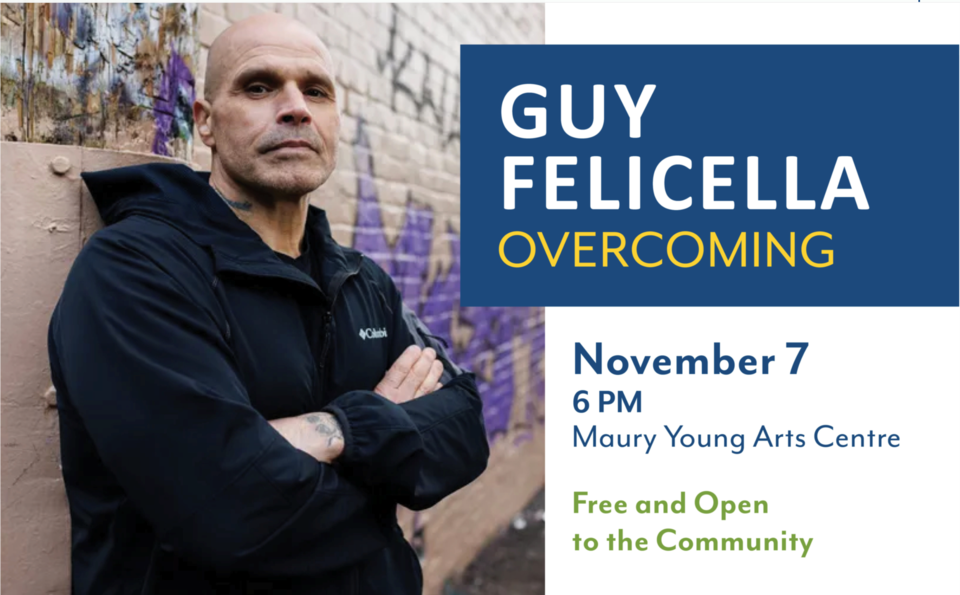Opening up about mental health and substance use isn’t easy, but it’s an important choice for both individual well-being and changing societal narratives. An upcoming event aims to normalize talking about the topics for Whistlerites.
Whistler Waldorf School (WWS) is hosting international public speaker, Guy Felicella, as part of a.” Felicella is a former drug user who went from gang involvement, six overdoses and years of homelessness to working with Vancouver Coastal Health and the British Columbia Centre on Substance Use. Today, he uses his lived experience advocating for both harm reduction and recovery policies.
Hosted at the Maury Young Arts Centre Nov. 7 at 6 p.m., the free event is funded by the Whistler Health Care Foundation (WHCF).
While Felicella has spoken at a medical conference in Whistler before, this is his first school speaking engagement in the ski town. While he doesn’t advocate for people to use substances, he’s clear-eyed about the likelihood of experimenting with drugs. He focuses on harm reduction and recovery for a holistic approach.
Harm reduction includes a number of strategies, from information on safer drug use, overdose prevention centres and supervised consumption sites, needle and syringe programs, drug checking, housing, opioid agonist therapy, legal services and overdose reversal, and more .
By focusing on recovery alone without harm reduction, people experimenting with drugs and those addicted are exposed to a toxic drug supply and unrealistic expectations about the time it takes to recover from addiction.
“Saying, ‘Get off the drugs,’ is a simplistic slogan that doesn’t reflect the reality of people’s lives. It took me 31 years of trying to stay sober, going in and out of treatment. In moments throughout my whole journey, I always went back to the drugs, and if harm reduction didn't exist, I wouldn't be alive,” Felicella said.
“It wasn't recovery that was coming down to the back alleys of the Downtown Eastside trying to tell me about recovery. There was harm reduction telling me, ‘Hey, dude, you got to go try recovery, because we're worried that you're going to die.’ People don't talk about that enough, and they often just think harm reduction enables people to continue their addiction. It enables people to actually live so that they can battle the addiction.”
Politicizing mental health and addiction
The talk also comes on the heels of an election which saw politicization of life-saving harm reduction programs.
The , with party leader John Rustad calling supervised injection sites “drug dens.” NDP leader and , David Eby, pivoted his party’s position by for people with severe addiction and mental-health issues. Green Party Leader Sonia Furstenau decried these policy positions as “dehumanizing rhetoric.”
The “the recent announcement [by Eby] is concerning to CMHA 小蓝视频, knowing that there is a lack of evidence to support the effectiveness of involuntary treatment for people with substance use disorder, and that existing evidence actually suggests that involuntary treatment leads to an increased risk of death due to drug poisoning upon release.”
Harm reduction in Whistler
Donations from the event will go towards the Whistler Community Services Society (WCSS) and help fund outreach programs. Their is $80,000.
Jackie Dickinson, executive director for WCSS, said there’s often a misunderstanding about how harm reduction works. While free drug testing is available at WCSS, services offered are far more than helping people practice safer drug use.
“The reality is, people are coming in, especially to a location like ours, and they're receiving mental-health support, information around housing, access to our food bank, access to clothing and shoes and accessible services through our thrift store at no cost to them," she said. "And so it’s an entry point to opening up to so many different services."
Fall and spring may be the slowest time for tourism in Whistler, but it’s the busiest for WCSS. While seasonal blues could be a factor, Dickinson attributed the rise to multiple local factors.
“What I think is unique or different about Whistler is that that time is also marked with unemployment, traditionally, for a lot of people in community… higher unemployment, difficult weather to get through, and then also a pause in a lot of the things that help alleviate our mental health, which is spending time outside or participating in activities that bring people together,” she said.
‘Profound mental-health crisis’
WWS program coordinator Ali Blancher said the decision to bring in Felicella aligns with Waldorf education and recognition of rising youth mental-health crisis across Canada.
“We recognize that today, youth are navigating a fairly profound mental-health crisis, and so we wanted to create a platform that reflected those various mental-health needs," she said. "And in Waldorf education, biography plays a really powerful role. It offers the students insight into the lives of others and through those lived experiences, they can see how other people have faced adversity and have come out stronger. It's a really profound reminder that sometimes challenges can foster growth and resilience."
The talk is open to the public and voluntary for WWS students. While WWS has internal programming for students experiencing mental-health challenges, Blancher said open discussions decrease stigma.
“Through community, there's also growth, so it opens up the conversation and allows us to foster greater understanding and compassion for mental-health challenges and what supports are available beyond the walls of institutions,” she said.
Stay tuned for two more speaker series events tackling topics like undiagnosed learning challenges, bullying, ADHD and self-esteem.


